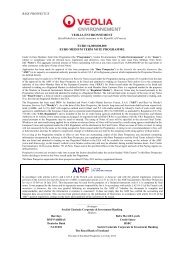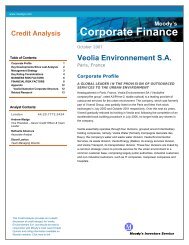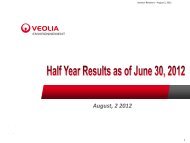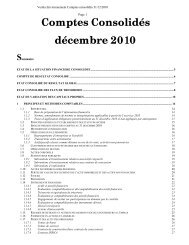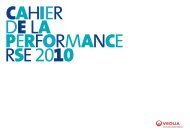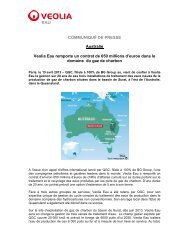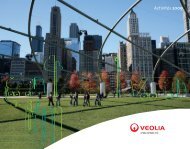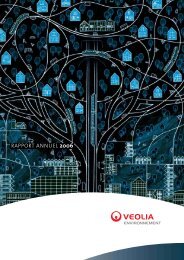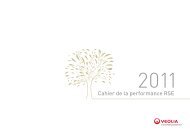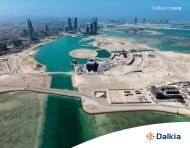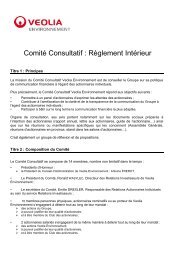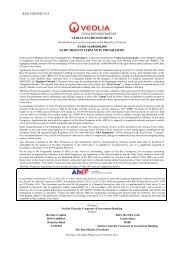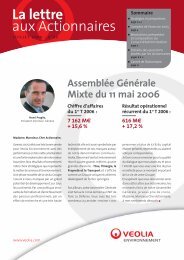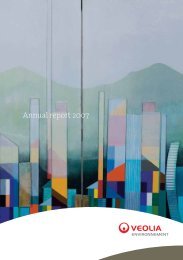Business Overview 2009 (pdf - 6.8MB) - Veolia Water
Business Overview 2009 (pdf - 6.8MB) - Veolia Water
Business Overview 2009 (pdf - 6.8MB) - Veolia Water
You also want an ePaper? Increase the reach of your titles
YUMPU automatically turns print PDFs into web optimized ePapers that Google loves.
Our achievements / Pushing back the boundaries of our business<br />
Éco Environnement<br />
Ingénierie<br />
Numerous projects for urban areas designed<br />
to minimize their impact on the environment<br />
have been developed in the past 15 years: the<br />
BedZED ecological village (UK), the Vauban<br />
District in Freiburg (Germany), Masdar City<br />
planned for 2015 (Abu Dhabi), etc. Right from<br />
their design stage, these model sites include<br />
ambitious goals for local water management,<br />
energy consumption and the ecological<br />
footprint of housing and transportation.<br />
<strong>Veolia</strong> Environnement’s Éco Environnement<br />
Ingénierie (2EI) consultancy and engineering<br />
firm specializing in sustainable urban<br />
development was created to provide, through<br />
partnerships with urban planners and<br />
architects, solutions to sustainable urban<br />
project developers. With the support of the<br />
technical departments of <strong>Veolia</strong><br />
Environnement’s four divisions and R&D, 2EI<br />
directs development projects toward an<br />
economic and environmental optimum<br />
incorporating local solutions (recycling<br />
stormwater and surface runoff after<br />
treatment, solar panels, pneumatic waste<br />
collection, etc.), and solutions based on the<br />
installation of public utility networks (water<br />
management master plan, mass transit,<br />
heating networks fired by biomass, etc.). Since<br />
its creation in <strong>2009</strong>, 2EI has been awarded an<br />
environmental and urban analysis contract<br />
for the Esplanade mixed housing<br />
development in Grenoble, France, and the<br />
environmental assessment (with a major<br />
section on modal shifts) for the creation of the<br />
future Nice TGV high-speed rail multimodal<br />
center (France).<br />
their future needs. This brings the company to review<br />
the scope of its business at regular intervals. In Europe,<br />
for example, in the past few years, there has been increasing<br />
focus—with varying degrees of controversy depending<br />
on the country—on the issue of rainwater harvesting<br />
for domestic or industrial uses. As a responsible operator,<br />
<strong>Veolia</strong> <strong>Water</strong> is obliged to take a stance on this issue.<br />
In France, where legislation now allows this practice<br />
for certain applications, the company is seeking the best<br />
way to reconcile the use of this alternative water resource<br />
and public health issues. We have installed several units<br />
for single dwellings and for apartment blocks.<br />
It is often in helping clients deal with emerging issues or<br />
to comply with increasingly stringent environmental<br />
regulations that <strong>Veolia</strong> <strong>Water</strong> advances even further down<br />
the path to innovation.<br />
After having established its offer for identifying hazardous<br />
substances in effluent (see page 32), <strong>Veolia</strong> <strong>Water</strong> is now<br />
assessing the solutions it may be able to present to<br />
its clients to help them reduce the use of these same<br />
substances in their processes or to treat them.<br />
Additionally, we are examining the possibility of recovering<br />
these substances efficiently and cost-effectively,<br />
through differential flow treatment.<br />
25,000<br />
The number of employees worldwide involved<br />
in <strong>Veolia</strong> <strong>Water</strong>’s Innovation and Continuous<br />
Improvement approach. Almost 3,000 ideas<br />
for improvements have been received.<br />
Anticipate major changes<br />
Looking further ahead to save resources, <strong>Veolia</strong> <strong>Water</strong><br />
and its subsidiaries pool their expertise to make progress<br />
in industrial ecology. They focus on identifying tailored<br />
solutions, especially materials recovery, an area where<br />
widely varying and complex needs require a high level<br />
of technical expertise.<br />
Again looking to the future, <strong>Veolia</strong> <strong>Water</strong> is preparing<br />
a revolutionary concept: the wastewater treatment plant<br />
of the future. This major technological leap will see<br />
the treatment plant turn into a bio-refinery, capable<br />
of recovering wastewater as a “raw material” for the<br />
production of added-value products (see box page 47).<br />
This new-generation plant is a link in the sustainable city<br />
of the future that will include, right from its design phase,<br />
environmental services (water, transportation, energy and<br />
waste management). <strong>Veolia</strong> Environnement’s<br />
Éco Environnement Ingénierie (2EI) consultancy<br />
and environmental engineering firm is developing<br />
this vision of the sustainable city as part of concrete<br />
development projects. It relies on the expertise of<br />
<strong>Veolia</strong> <strong>Water</strong> and the three other <strong>Veolia</strong> Environnement<br />
divisions (see box page 46).<br />
46 <strong>Veolia</strong> <strong>Water</strong> <strong>2009</strong>



